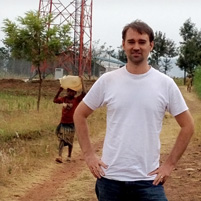Seeding Energy Innovation

Nathan Williams
Hundreds of cell towers dot the landscape of rural Rwanda. They service areas miles from established energy grids, but soon they could anchor a system of microgrids electrifying the country's rural areas.
Carnegie Mellon University's Nathan Williams, a Ph.D. student in the Department of Engineering and Public Policy (EPP), is exploring that possibility in part with assistance from a seed grant from the Wilton E. Scott Institute for Energy Innovation.
Williams came to CMU's Pittsburgh campus to explore ways of encouraging private industry to participate in the electrification of rural areas in sub-Saharan Africa. Shortly after arriving, he met and began working with Bruce Krogh, electrical and computer engineering (ECE) professor and head of Carnegie Mellon University in Rwanda; Taha Selim Ustun, an ECE professor; and his adviser, Paulina Jaramillo, an EPP assistant professor.
The team used grant funds to build relationships with Rwanda's major utility, support research by CMU-Rwanda master's degree students and enable Williams to explore one model of incentivizing investment in microgrids. In addition, Williams' work is supported by a Dean's fellowship and other sources.
"One of the challenges that these microgrids have is that the business model is based on selling electricity to people who don't currently have electricity," Williams said. "Cell towers provide a good opportunity to leverage a strong economic anchor. They have very predictable electricity use patterns, so if you're going to go out and build a microgrid, you're guaranteed a minimum level of energy consumption."
The seed grant was especially important to him because it helped establish ties with CMU-Rwanda and the people the grids would serve.
"Getting out there and being on the ground to see how the energy sector in Rwanda actually works is very useful to put my research in context," Williams said. "Going there, meeting with stakeholders, talking to people from government and the private sector and nongovernmental organizations helps you become immersed in that environment and understand what their real needs are."
Williams presented on behalf of the team at a symposium held in the Singleton Room at Carnegie Mellon on Sept. 22 to showcase the work supported by Scott Institute seed grants awarded in 2012. The team was comprised of Krogh; Marija Ilic, ECE professor; and Hedda Schmidtke, professor of information communications technology.
Other grantees who discussed their work included:
- Sheng Shen, professor of mechanical engineering, who along with Gary Fedder, associate dean for research for the College of Engineering and the Howard M. Wilkoff Professor of Electrical and Computer Engineering, is producing high efficiency solar thermo-photovoltaic cells using nanophotonic intermediate absorbers and emitters.
- Erik Ydstie, professor of chemical engineering, who in partnership with Aditya Khair, assistant professor of chemical engineering, is exploring the potential of manufacturing silicon wafers for solar cells by horizontal ribbon growth.
- Gabriela Hug, professor of ECE, is collaborating with Soummya Kar, assistant research professor in ECE. They are developing a collaborative distributed optimization framework for robust energy management in microgrids.
- Inês Azevedo and Lee Branstetter, both EPP professors, are working to understand the causes and consequences of China's wind power manufacturing surge.
- Nina Baird, an adjunct faculty member with the Center for Building Performance and Diagnostics, is working to map infrastructures for energy recapture. The project is a result of prior research looking at how to make social media more energy efficient.
Energy Seed Grants Foster New Research
The six presenters comprise the first class of annual seed grant recipients made possible by the Scott Institute. They were chosen from a field of 26 applicants from across the university.
The second round of seed fund winners was announced in February 2014. The application period for the 2015 grants is open, and recipients will be selected in early December. This year's grants also will be supported by a gift from the EQT Foundation.
The Scott Institute was established in 2012 with a founding gift from CMU alumni Sherman Scott (E'66), president and founder of Delmar Systems, and his wife, university trustee Joyce Bowie Scott (A'65). Additional support for research in energy was provided by a generous grant from the Richard King Mellon Foundation of Pittsburgh in 2013.
Seed grants are awarded annually to a new crop of CMU researchers. The grants have enabled faculty to seek out new energy sources, improve energy production and efficiency, explore the environmental and economic impact of current and future practices, and shape the future of energy policy.
Jared L. Cohon, president emeritus, university professor of civil and environmental engineering and engineering and public policy, and director of the Scott Institute, provided a brief overview of the function and history of the institute. Andrew Gellman, Lord Professor of Chemical Engineering and co-director of the Scott Institute stressed the value of collaborative and interdisciplinary approaches to meeting the world's energy needs and the importance of supporting research in its earliest stages.
"Seed grants are a mechanism for people to initiate and then grow research programs," Gellman said. "To go from nothing to something is always very difficult and if you have a seed that comes from the Scott Institute, that serves as a nucleus that then attracts funding for further work in the same area."
Related Links: CMU Ph.D. Student Increasing Financial Feasibility of Microgrids | Carnegie Mellon's Scott Institute Announces Second Round of Seed Grants to Researchers | With First Round of Seed Grants, Carnegie Mellon's Scott Institute To Explore Technology, Policy Issues on Energy Efficiency, Sources | Carnegie Mellon University in Rwanda receives $60,000 Scott Institute Seed Grant to research Smart Grid technologies for sustainable energy development in Rwanda
